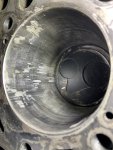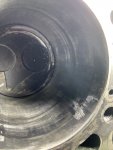yeah muriatic. Strong stuff and I've used it in the past. Use it outside a mile or so away from your metal building, cars, trucks, anything steel or aluminum. Also do not smoke anywhere near it because the reaction gives off hydrogen (explosive). And...the fumes from muriatic will kill you dead. Breathing protection is a must. Your block's metallurgy is also damaged, and will RUST immediately after washing it down. WD40 won't stop it from rusting. Nothing will but putting it into service immediately after washing it, in my experience. Get the stuff in the water jackets and the coolant will turn to rust quickly, and there's no fixing it. I have used it in the past on engine blocks and I won't use it anymore. I'd just as soon carry the block to the machine shop and let them bake it out before doing the machine work necessary. A lot less dangerous and a lot less headache in the long run.
muriatic works but it doesn't solve the fact that the cylinder is likely junk.
again once metal transfer occurs, there is good reason why. The piston makes contact with the cylinder dur to expansion and/or lack of lubricating oil. When it happens the cylinder is almost always trashed. Putting new pistons into a oblong or tapered cylinder is not a good thing to do. Neither is putting new pistons into a block that has excessive bore size, results in much reduced engine life. This is a big job. If one goes through pulling the engine,and halfasses the work, a few years later when it loses compression and won't run on one or more cylinders, you'll be second guessing yourself. Why on earth didn't I do it right the first time? Trust me I have been there.
At the very least grab yourself a dial bore gauge and measure the bores after removing the aluminum. The WSM tells you how much taper and oblong is acceptable, and it is not much. Diesels are different than gas burners and gas burning 2 strokes are totally different than 4 stroke. Diesels, especially smaller ones, are highly sensitive to compression pressure and it takes VERY little imperfection in the cylinder walls, pistons, rings, head(s), valves, gaskets, etc to cause a compression loss--results in hard starting, or no-start. And then ya come back in this forum asking why it won't start when cold, and 5 replies saying your injectors are bad the pump's bad or you're using the wrong color hydrualic fluid causing your engine to stop running.



